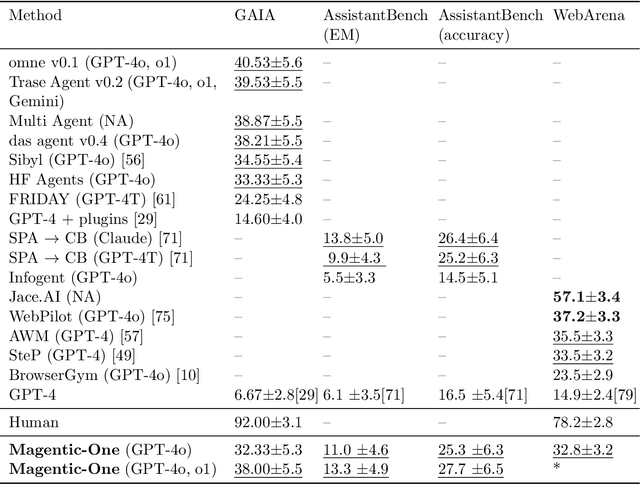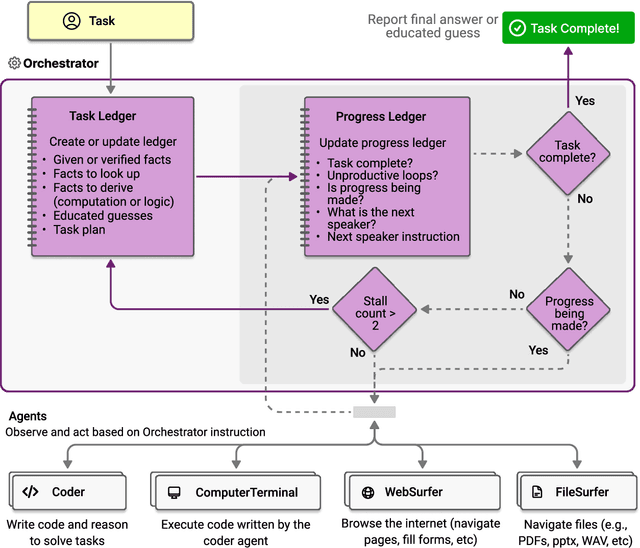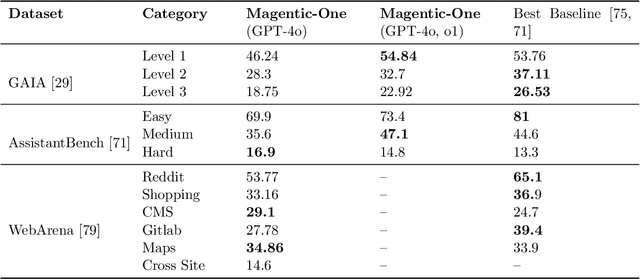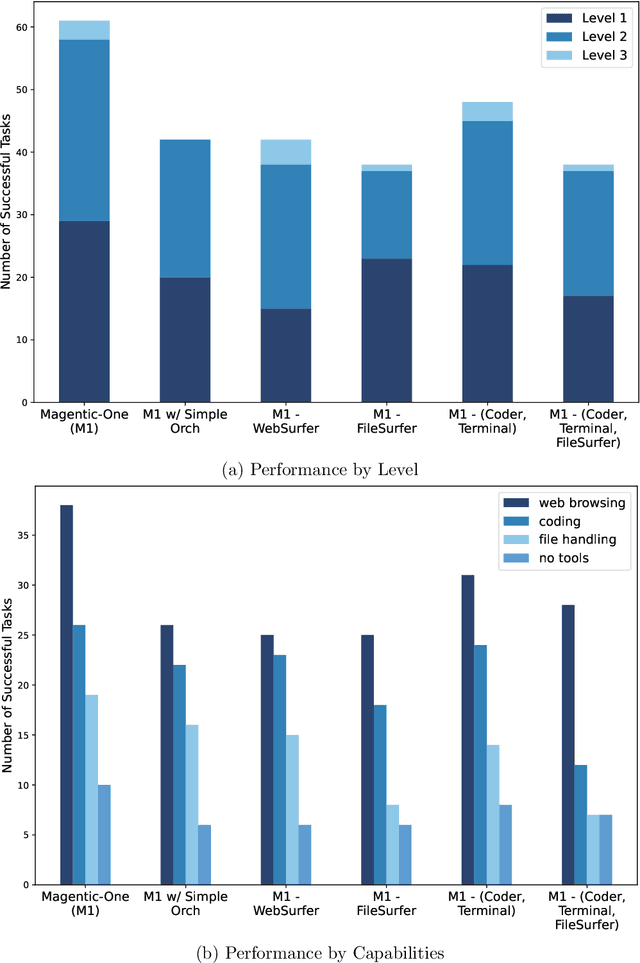Adam Fourney
Eric
Magentic-UI: Towards Human-in-the-loop Agentic Systems
Jul 30, 2025Abstract:AI agents powered by large language models are increasingly capable of autonomously completing complex, multi-step tasks using external tools. Yet, they still fall short of human-level performance in most domains including computer use, software development, and research. Their growing autonomy and ability to interact with the outside world, also introduces safety and security risks including potentially misaligned actions and adversarial manipulation. We argue that human-in-the-loop agentic systems offer a promising path forward, combining human oversight and control with AI efficiency to unlock productivity from imperfect systems. We introduce Magentic-UI, an open-source web interface for developing and studying human-agent interaction. Built on a flexible multi-agent architecture, Magentic-UI supports web browsing, code execution, and file manipulation, and can be extended with diverse tools via Model Context Protocol (MCP). Moreover, Magentic-UI presents six interaction mechanisms for enabling effective, low-cost human involvement: co-planning, co-tasking, multi-tasking, action guards, and long-term memory. We evaluate Magentic-UI across four dimensions: autonomous task completion on agentic benchmarks, simulated user testing of its interaction capabilities, qualitative studies with real users, and targeted safety assessments. Our findings highlight Magentic-UI's potential to advance safe and efficient human-agent collaboration.
Navigating Rifts in Human-LLM Grounding: Study and Benchmark
Mar 18, 2025Abstract:Language models excel at following instructions but often struggle with the collaborative aspects of conversation that humans naturally employ. This limitation in grounding -- the process by which conversation participants establish mutual understanding -- can lead to outcomes ranging from frustrated users to serious consequences in high-stakes scenarios. To systematically study grounding challenges in human-LLM interactions, we analyze logs from three human-assistant datasets: WildChat, MultiWOZ, and Bing Chat. We develop a taxonomy of grounding acts and build models to annotate and forecast grounding behavior. Our findings reveal significant differences in human-human and human-LLM grounding: LLMs were three times less likely to initiate clarification and sixteen times less likely to provide follow-up requests than humans. Additionally, early grounding failures predicted later interaction breakdowns. Building on these insights, we introduce RIFTS: a benchmark derived from publicly available LLM interaction data containing situations where LLMs fail to initiate grounding. We note that current frontier models perform poorly on RIFTS, highlighting the need to reconsider how we train and prompt LLMs for human interaction. To this end, we develop a preliminary intervention that mitigates grounding failures.
Interactive Debugging and Steering of Multi-Agent AI Systems
Mar 03, 2025Abstract:Fully autonomous teams of LLM-powered AI agents are emerging that collaborate to perform complex tasks for users. What challenges do developers face when trying to build and debug these AI agent teams? In formative interviews with five AI agent developers, we identify core challenges: difficulty reviewing long agent conversations to localize errors, lack of support in current tools for interactive debugging, and the need for tool support to iterate on agent configuration. Based on these needs, we developed an interactive multi-agent debugging tool, AGDebugger, with a UI for browsing and sending messages, the ability to edit and reset prior agent messages, and an overview visualization for navigating complex message histories. In a two-part user study with 14 participants, we identify common user strategies for steering agents and highlight the importance of interactive message resets for debugging. Our studies deepen understanding of interfaces for debugging increasingly important agentic workflows.
Magentic-One: A Generalist Multi-Agent System for Solving Complex Tasks
Nov 07, 2024



Abstract:Modern AI agents, driven by advances in large foundation models, promise to enhance our productivity and transform our lives by augmenting our knowledge and capabilities. To achieve this vision, AI agents must effectively plan, perform multi-step reasoning and actions, respond to novel observations, and recover from errors, to successfully complete complex tasks across a wide range of scenarios. In this work, we introduce Magentic-One, a high-performing open-source agentic system for solving such tasks. Magentic-One uses a multi-agent architecture where a lead agent, the Orchestrator, plans, tracks progress, and re-plans to recover from errors. Throughout task execution, the Orchestrator directs other specialized agents to perform tasks as needed, such as operating a web browser, navigating local files, or writing and executing Python code. We show that Magentic-One achieves statistically competitive performance to the state-of-the-art on three diverse and challenging agentic benchmarks: GAIA, AssistantBench, and WebArena. Magentic-One achieves these results without modification to core agent capabilities or to how they collaborate, demonstrating progress towards generalist agentic systems. Moreover, Magentic-One's modular design allows agents to be added or removed from the team without additional prompt tuning or training, easing development and making it extensible to future scenarios. We provide an open-source implementation of Magentic-One, and we include AutoGenBench, a standalone tool for agentic evaluation. AutoGenBench provides built-in controls for repetition and isolation to run agentic benchmarks in a rigorous and contained manner -- which is important when agents' actions have side-effects. Magentic-One, AutoGenBench and detailed empirical performance evaluations of Magentic-One, including ablations and error analysis are available at https://aka.ms/magentic-one
Towards better Human-Agent Alignment: Assessing Task Utility in LLM-Powered Applications
Feb 22, 2024Abstract:The rapid development in the field of Large Language Models (LLMs) has led to a surge in applications that facilitate collaboration among multiple agents to assist humans in their daily tasks. However, a significant gap remains in assessing whether LLM-powered applications genuinely enhance user experience and task execution efficiency. This highlights the pressing need for methods to verify utility of LLM-powered applications, particularly by ensuring alignment between the application's functionality and end-user needs. We introduce AgentEval provides an implementation for the math problems, a novel framework designed to simplify the utility verification process by automatically proposing a set of criteria tailored to the unique purpose of any given application. This allows for a comprehensive assessment, quantifying the utility of an application against the suggested criteria. We present a comprehensive analysis of the robustness of quantifier's work.
Accurate Measures of Vaccination and Concerns of Vaccine Holdouts from Web Search Logs
Jun 12, 2023Abstract:To design effective vaccine policies, policymakers need detailed data about who has been vaccinated, who is holding out, and why. However, existing data in the US are insufficient: reported vaccination rates are often delayed or missing, and surveys of vaccine hesitancy are limited by high-level questions and self-report biases. Here, we show how large-scale search engine logs and machine learning can be leveraged to fill these gaps and provide novel insights about vaccine intentions and behaviors. First, we develop a vaccine intent classifier that can accurately detect when a user is seeking the COVID-19 vaccine on search. Our classifier demonstrates strong agreement with CDC vaccination rates, with correlations above 0.86, and estimates vaccine intent rates to the level of ZIP codes in real time, allowing us to pinpoint more granular trends in vaccine seeking across regions, demographics, and time. To investigate vaccine hesitancy, we use our classifier to identify two groups, vaccine early adopters and vaccine holdouts. We find that holdouts, compared to early adopters matched on covariates, are 69% more likely to click on untrusted news sites. Furthermore, we organize 25,000 vaccine-related URLs into a hierarchical ontology of vaccine concerns, and we find that holdouts are far more concerned about vaccine requirements, vaccine development and approval, and vaccine myths, and even within holdouts, concerns vary significantly across demographic groups. Finally, we explore the temporal dynamics of vaccine concerns and vaccine seeking, and find that key indicators emerge when individuals convert from holding out to preparing to accept the vaccine.
When to Show a Suggestion? Integrating Human Feedback in AI-Assisted Programming
Jun 08, 2023Abstract:AI powered code-recommendation systems, such as Copilot and CodeWhisperer, provide code suggestions inside a programmer's environment (e.g., an IDE) with the aim to improve their productivity. Since, in these scenarios, programmers accept and reject suggestions, ideally, such a system should use this feedback in furtherance of this goal. In this work we leverage prior data of programmers interacting with Copilot to develop interventions that can save programmer time. We propose a utility theory framework, which models this interaction with programmers and decides when and which suggestions to display. Our framework Conditional suggestion Display from Human Feedback (CDHF) is based on predictive models of programmer actions. Using data from 535 programmers we build models that predict the likelihood of suggestion acceptance. In a retrospective evaluation on real-world programming tasks solved with AI-assisted programming, we find that CDHF can achieve favorable tradeoffs. Our findings show the promise of integrating human feedback to improve interaction with large language models in scenarios such as programming and possibly writing tasks.
Generation Probabilities Are Not Enough: Exploring the Effectiveness of Uncertainty Highlighting in AI-Powered Code Completions
Feb 14, 2023



Abstract:Large-scale generative models enabled the development of AI-powered code completion tools to assist programmers in writing code. However, much like other AI-powered tools, AI-powered code completions are not always accurate, potentially introducing bugs or even security vulnerabilities into code if not properly detected and corrected by a human programmer. One technique that has been proposed and implemented to help programmers identify potential errors is to highlight uncertain tokens. However, there have been no empirical studies exploring the effectiveness of this technique-- nor investigating the different and not-yet-agreed-upon notions of uncertainty in the context of generative models. We explore the question of whether conveying information about uncertainty enables programmers to more quickly and accurately produce code when collaborating with an AI-powered code completion tool, and if so, what measure of uncertainty best fits programmers' needs. Through a mixed-methods study with 30 programmers, we compare three conditions: providing the AI system's code completion alone, highlighting tokens with the lowest likelihood of being generated by the underlying generative model, and highlighting tokens with the highest predicted likelihood of being edited by a programmer. We find that highlighting tokens with the highest predicted likelihood of being edited leads to faster task completion and more targeted edits, and is subjectively preferred by study participants. In contrast, highlighting tokens according to their probability of being generated does not provide any benefit over the baseline with no highlighting. We further explore the design space of how to convey uncertainty in AI-powered code completion tools, and find that programmers prefer highlights that are granular, informative, interpretable, and not overwhelming.
Aligning Offline Metrics and Human Judgments of Value of AI-Pair Programmers
Oct 29, 2022Abstract:Large language models trained on massive amounts of natural language data and code have shown impressive capabilities in automatic code generation scenarios. Development and evaluation of these models has largely been driven by offline functional correctness metrics, which consider a task to be solved if the generated code passes corresponding unit tests. While functional correctness is clearly an important property of a code generation model, we argue that it may not fully capture what programmers value when collaborating with their AI pair programmers. For example, while a nearly correct suggestion that does not consider edge cases may fail a unit test, it may still provide a substantial starting point or hint to the programmer, thereby reducing total needed effort to complete a coding task. To investigate this, we conduct a user study with (N=49) experienced programmers, and find that while both correctness and effort correlate with value, the association is strongest for effort. We argue that effort should be considered as an important dimension of evaluation in code generation scenarios. We also find that functional correctness remains better at identifying the highest-value generations; but participants still saw considerable value in code that failed unit tests. Conversely, similarity-based metrics are very good at identifying the lowest-value generations among those that fail unit tests. Based on these findings, we propose a simple hybrid metric, which combines functional correctness and similarity-based metrics to capture different dimensions of what programmers might value and show that this hybrid metric more strongly correlates with both value and effort. Our findings emphasize the importance of designing human-centered metrics that capture what programmers need from and value in their AI pair programmers.
Reading Between the Lines: Modeling User Behavior and Costs in AI-Assisted Programming
Oct 25, 2022



Abstract:AI code-recommendation systems (CodeRec), such as Copilot, can assist programmers inside an IDE by suggesting and autocompleting arbitrary code; potentially improving their productivity. To understand how these AI improve programmers in a coding session, we need to understand how they affect programmers' behavior. To make progress, we studied GitHub Copilot, and developed CUPS -- a taxonomy of 12 programmer activities common to AI code completion systems. We then conducted a study with 21 programmers who completed coding tasks and used our labeling tool to retrospectively label their sessions with CUPS. We analyze over 3000 label instances, and visualize the results with timelines and state machines to profile programmer-CodeRec interaction. This reveals novel insights into the distribution and patterns of programmer behavior, as well as inefficiencies and time costs. Finally, we use these insights to inform future interventions to improve AI-assisted programming and human-AI interaction.
 Add to Chrome
Add to Chrome Add to Firefox
Add to Firefox Add to Edge
Add to Edge